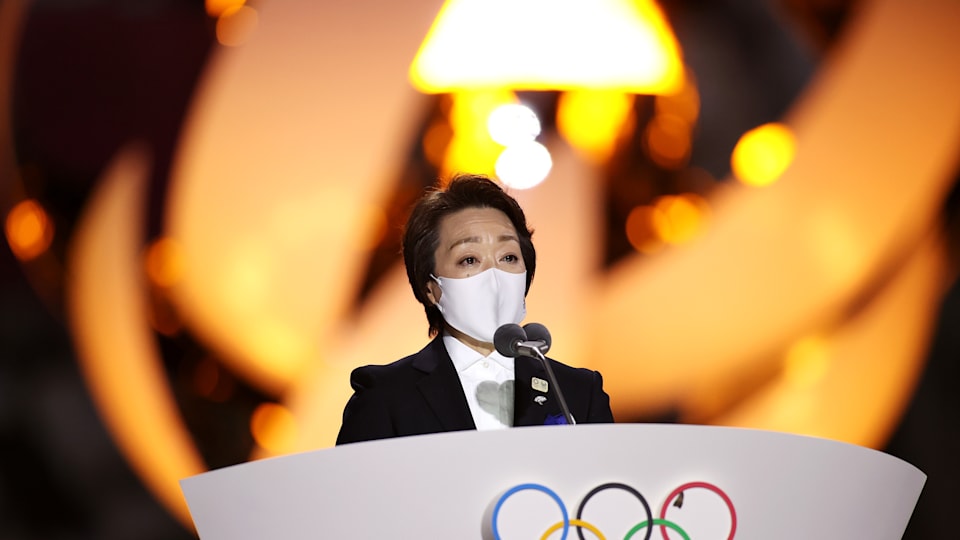Hashimoto Seiko named world winner in the 2021 IOC Women and Sport Awards
The president of the Tokyo 2020 Organising Committee for the Olympic Games has long pushed against conservative attitudes towards women as a politician. Meanwhile, the five 2021 continental award winners have found many inventive ways to push gender equality.

The IOC has announced the winners of the 2021 IOC Women and Sport Awards during a small ceremony following the 139th IOC Session in Beijing on 3 February 2022.
Each year, the IOC Women and Sport Awards are given to women, men or organisations who have made remarkable contributions to the development of women and girls’ participation in sport.
The winners are supported with a grant to help them extend their work.
The world winner was Hashimoto Seiko of Japan, President of the Tokyo 2020 Organising Committee (OCOG) and seven-time Olympian-turned-politician.
Olympic cyclist and speed skater Hashimoto strived for gender equality both within sport and far more broadly during her tenure as a politician.
As President of the OCOG, she doubled female representation on the OCOG Executive Board and strengthened gender balance, diversity and inclusion across the Games.
President of the International Olympic Committee, Thomas Bach, has spoken about the force the awards carry, with sport having “the power to challenge social norms and set the tone for social change.
“For over 20 years, the IOC Women and Sport Awards have been recognising and celebrating the many people and organisations that help us realise this mission.”
Addressing Hashimoto, he said: “It needed someone like you to lead these Olympic Games to success.
“Someone with a proven track record of challenging the status quo. Fighting for gender equality. Pushing the boundaries for more inclusion. Shattering glass ceilings for more diversity.”
Five continental winners, five very different approaches
Five continental winners were also named.
Seventeen-year-old Natsiraishe Maritsa of Zimbabwe was named the winner for Africa. Maritsa uses the taekwondo club she runs as a platform to combat gender-based violence and child marriage.
“The award gave me strength and the grant will formalise my project because at the moment I'm running the project from my family's small yard.
“Hence with the grant, I will be able to acquire a sporting premise which will be equipped and provide a healthy and safe environment to all participants without discrimination.”
The American award went to New York non-profit Figure Skating in Harlem.
The organisation channels the disciplined creativity of speedskating along with education to give girls from low-income families in Harlem and the South Bronx an opportunity in life.
Asian winner Zhang Xia said, “I want to give more women spiritual encouragement and they can stand on my shoulders to see a bigger world.”
China’s 1991 wrestling world champion has officiated at the highest level and worked as the national coach.
As President of the Chinese Wrestling Federation, she improved opportunities for female referees and has fought for gender parity at events over the years.
As a United World Wrestling Bureau member, she supports and mentors women in sports administration.
European winner Kari Fasting of Norway is Professor Emerita at the Norwegian School of Sport Sciences.
For over 40 years, she has produced globally important research on women’s participation in sport and sporting organisations, and on the prevention of harassment and abuse in sport.
According to Fasting, while many sports equality projects have wrought changes, “sometimes the changes have only lasted as long as the project”.
To deliver a more sustained focus, she says, “My recommendation will be that all international sport federations and National Olympic Committees should have a gender equality plan.”
Tracey Holmes was named the winner for Oceania. The giant of Australian sports broadcasting has knocked over all kinds of female firsts in her profession.
In 1989, she created the Women in Sport Program run by her employer, the Australian Broadcasting Corporation (ABC). The programme ultimately helped normalise women’s sport coverage in Australia.
She now works as a mentor with female journalists in the Indo-Pacific and with Indigenous women.
The Women in Sport grant: creating a legacy and increasing defiance
Birgitta Kervinen, an award winner in 2017, used her grant to establish a sports leadership programme in an effort to change gender balance in that realm.
She knows the path has never been, and is still not, easy.
“I have very often been that ‘difficult woman’,” said the Finn.
“Tens of times I have been left alone when I have not been willing to make compromises that would have sacrificed my values.
“I have been belittled; I have met opposition… when I have defended my own values; but I know it has been worth it.”
